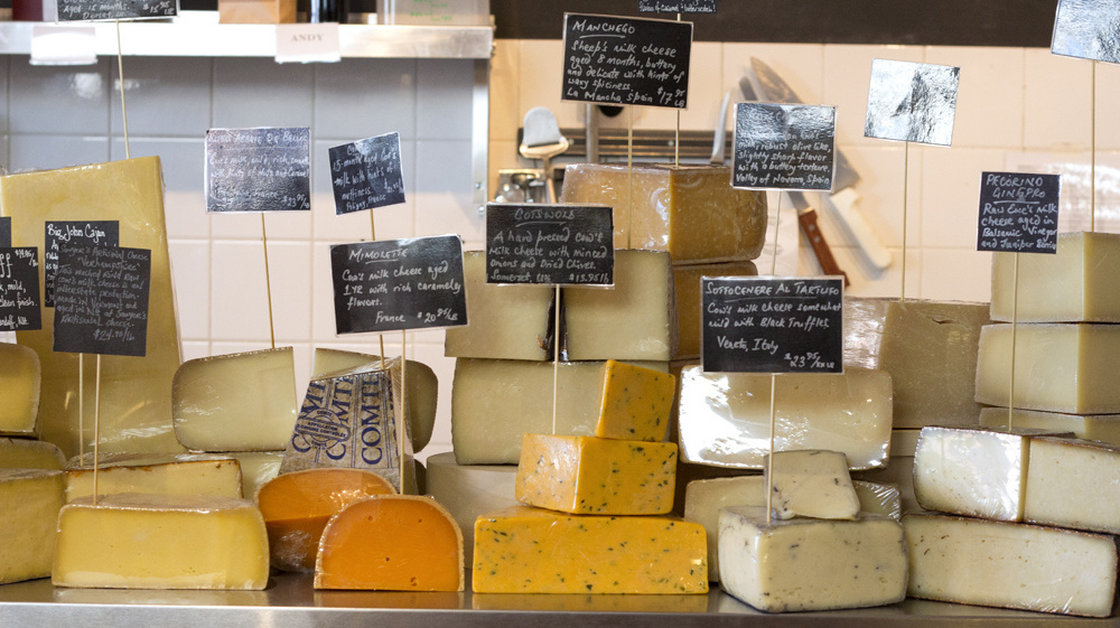
Post by LaToya Dennis, Milwaukee Public Radio for The Salt at NPR Food (3/4/2014)
Listen to the Story on Morning Edition

Post by LaToya Dennis, Milwaukee Public Radio for The Salt at NPR Food (3/4/2014)
Listen to the Story on Morning Edition
What's in a name? It's an age-old question Juliet once asked Romeo in Shakespeare's famed play.
Today, it's a serious question between the U.S. and the European Union, which has said it wants U.S. food makers to stop using European names.
But depending on what food you're talking about, a name could be a lot, says Kyle Cherek, the producer and host of a TV show called Wisconsin Foodie.
Cherek argues that certain products are so unique that only one country or region should be allowed to lay claim. So, for example, he says only onions from Vidalia, Ga., should be called American Vidalia, and Lambic beer absolutely has to come from a specific valley in Belgium.
"Roquefort, of course, has to come from that region" of France, he adds, because there's a distinctive fungus that gives the cheese its flavor.
But not everything fits into that category. Take, for instance, cheddar cheese — which is big business in Wisconsin.
"They simply can't legislate that into a region," Cherek says. "Cheddar is made in Australia, in the U.S., in Canada. It's made in probably seven or eight countries."
And therein lies the problem.
As part of negotiations over the Transatlantic Trade and Investment Partnership, the European Union wants the U.S. to prohibit food makers here from using names with historical ties to Europe.
That means popular cheeses like Gruyere, Brie and Parmesan could all be in line for a name change, thanks to the EU's proposed restrictions. The problem, says Steve Stettler, who owns Decatur Dairy in Brodhead, Wis., is that U.S. food makers have spent a lot of money building their brands.
"How do we educate our consumers? People have spent a great deal of money on labeling, building traditions, building a name on a product," Stettler says. "And then not being able to use that name would be kind of horrific."
His factory, located 100 miles from Milwaukee, currently makes a variety of cheeses, including Havarti, Swiss and Gouda. Right now, there's a 35,000-pound stainless steel vat full of liquid Muenster cheese — whose name may also have to be changed because it originates from France's Valley of Muenster — in the process of changing to a solid.
Since the EU started putting restrictions on food names in the mid-1990s, they've spread to other countries, says Shawna Morris of the U.S. Dairy Export Council.
A couple of years ago, she notes, a free trade agreement between the EU and South Korea "banned the sale of U.S. feta, Asiago, Gorgonzola and fontina to Korea."
Morris says Costa Rica recently decided against allowing the sale of American provolone and Parmesan, and South and Central America have similar restrictions.
She argues that it's less about civic pride, and more about competition.
"Actually, just last year, the U.S. became the largest single country exporter of cheese in the world," she says.
And nearly a quarter of all cheese produced in the U.S. comes from Wisconsin.
Even if the state's producers are eventually barred from using European-derived names for their cheeses, they'll always have Wisconsin's native product: cheese curds.
Copyright 2014 Milwaukee Public Radio.